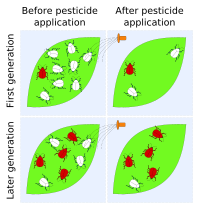
Photo from wikipedia
In Ecuador, the status of insecticide resistance for Aedes aegypti, the principal arboviral vector in the country, has not been previously evaluated. The aim of this research was to describe… Click to show full abstract
In Ecuador, the status of insecticide resistance for Aedes aegypti, the principal arboviral vector in the country, has not been previously evaluated. The aim of this research was to describe the resistance status of Ae. aegypti to the principal insecticides used for vector control in provinces with high reports of arboviral clinical cases. This was a descriptive study performed on Ae. aegypti collected from 2016 to 2017 in 14 localities of Ecuador. The larvae were reared and tested using bioassays applying the adulticides malathion and deltamethrin, and the larvicide temephos. The lethal concentrations were obtained for field-collected specimens and compared to the susceptible reference strain ROCK, MRA-734. Mosquitoes from all the localities showed resistance to deltamethrin and susceptibility to malathion. On the other hand, mosquitoes demonstrated resistance to the larvicide temephos in 5 of the 14 localities analyzed. The results obtained in this research may be used by healthcare decision-makers to improve vector control in Ecuador. Rotation of insecticides and alternative biological vector control strategies should be considered to manage the resistance observed in Ae. aegypti to deltamethrin and temephos. New strategies to use insecticides should also be aimed to prevent selective pressure with malathion.
Journal Title: Journal of the American Mosquito Control Association
Year Published: 2019
Link to full text (if available)
Share on Social Media: Sign Up to like & get
recommendations!